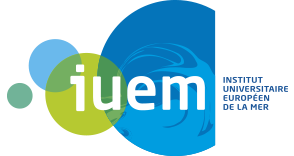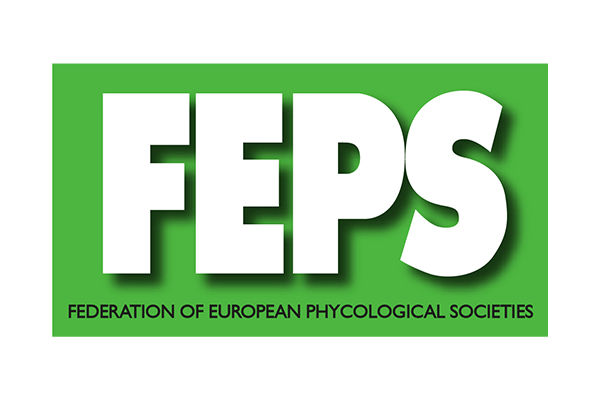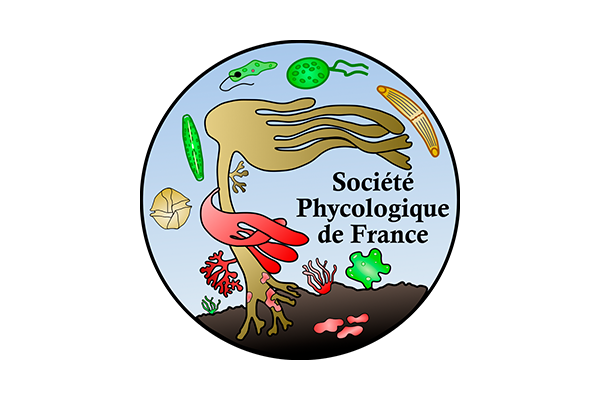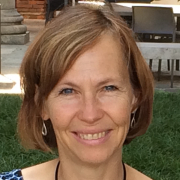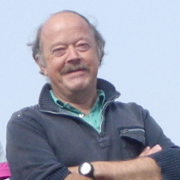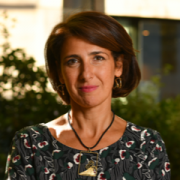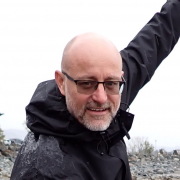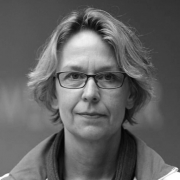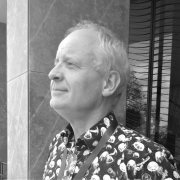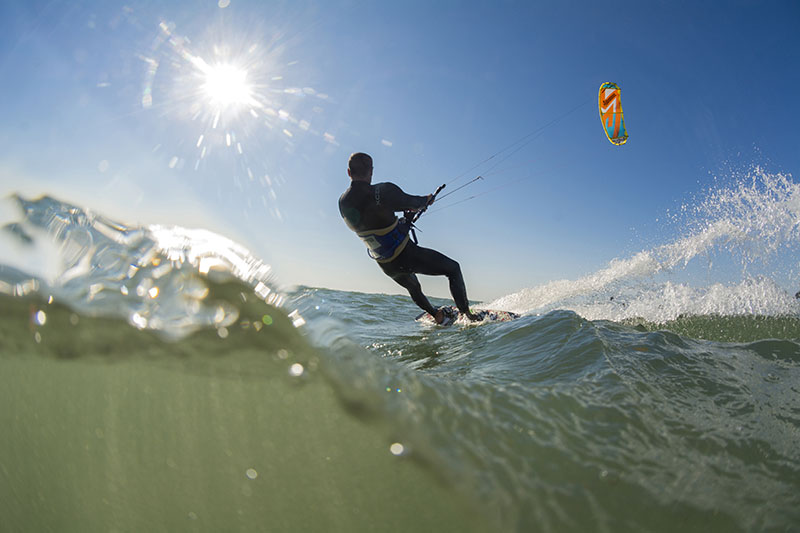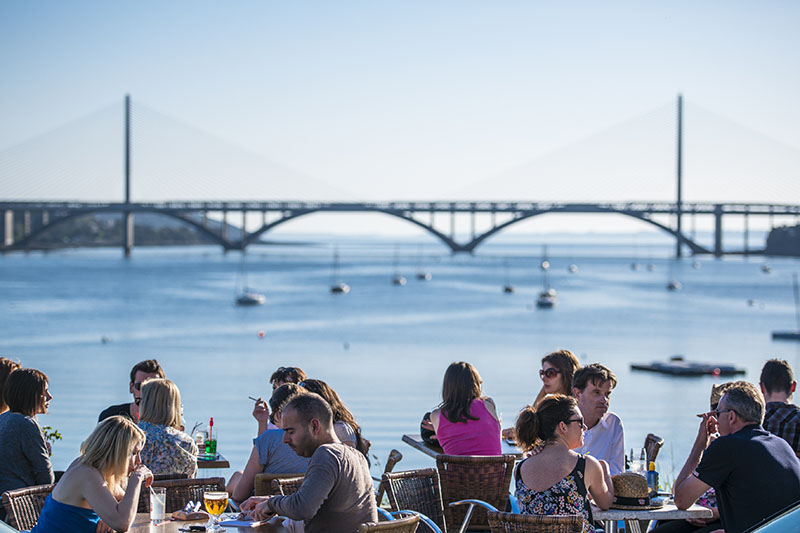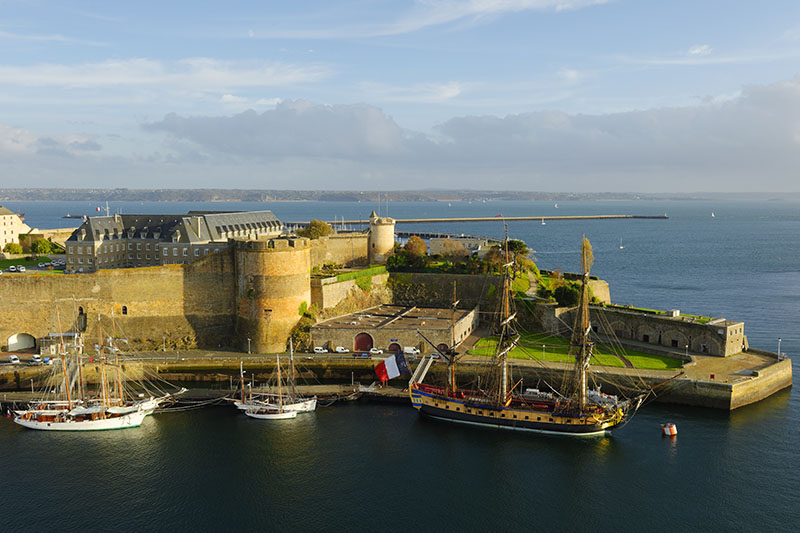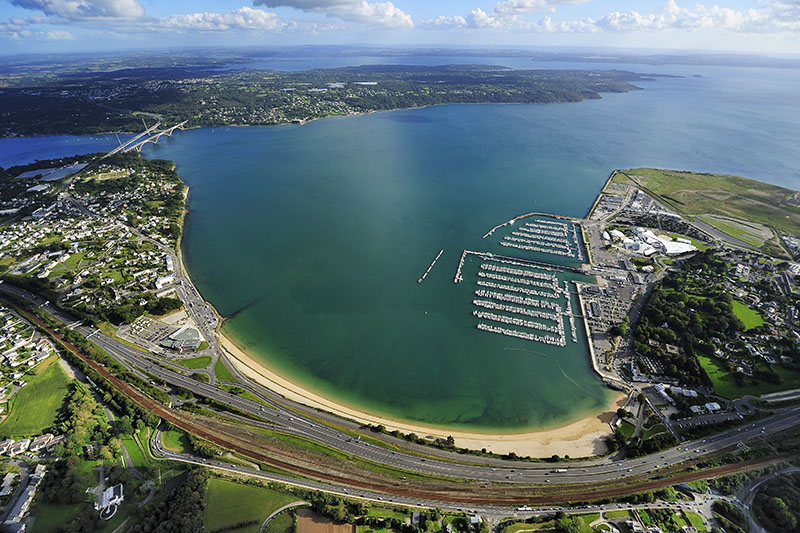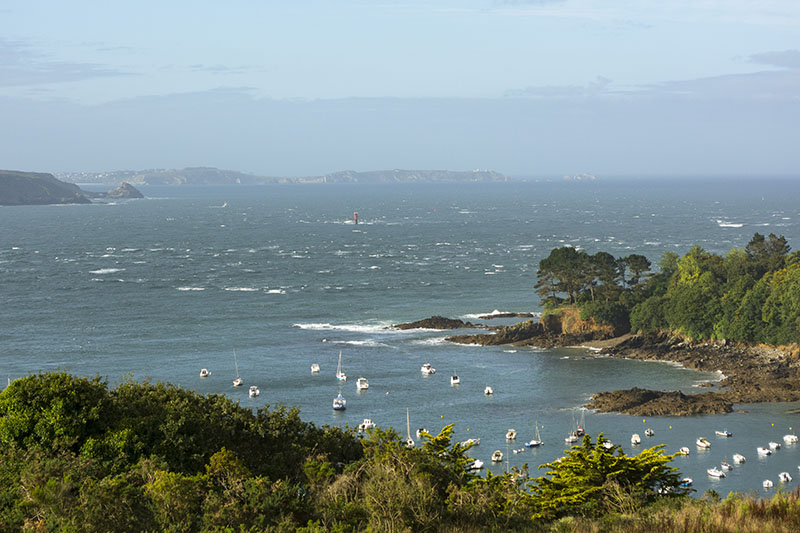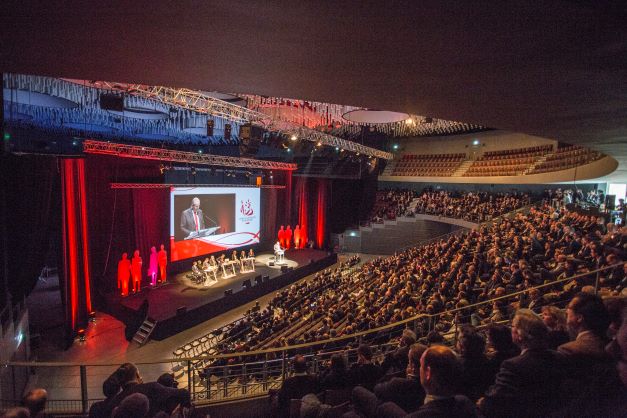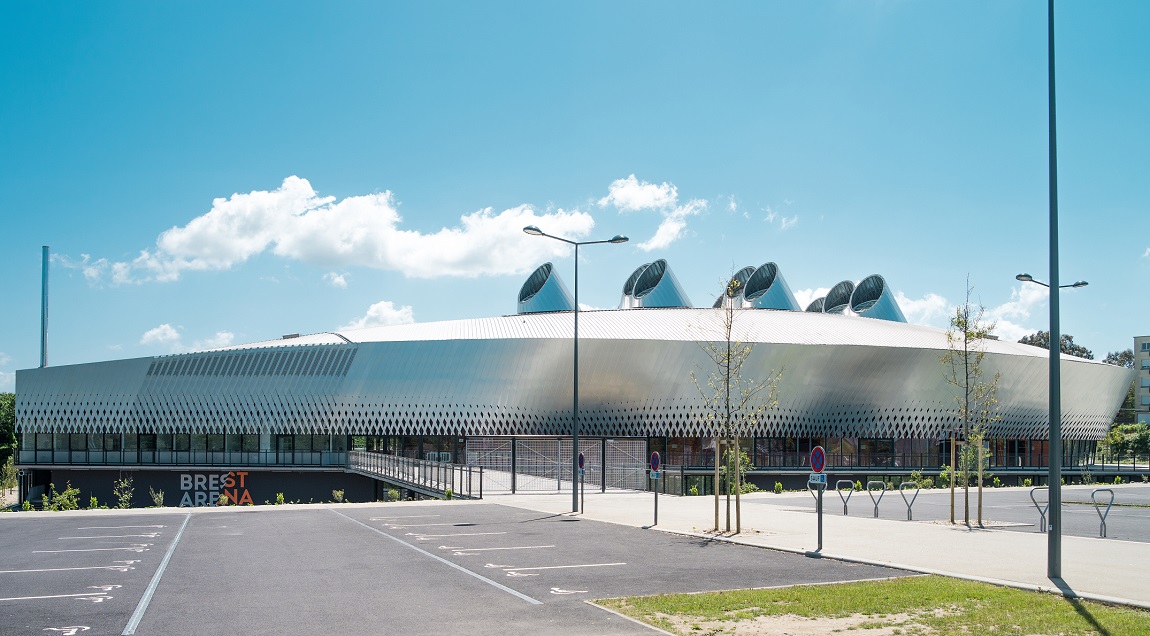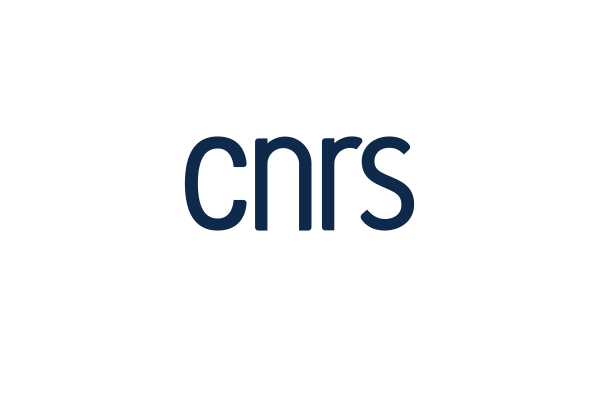After Zagreb in 2019, we are pleased to invite you to Brest (Brittany, France) for the 8th European Phycological Congress “Scientific Opportunities for a Global Algal Revolution” on behalf of the Federation of European Phycological Societies council and the French Phycological Society. France has a long and proud tradition of phycological research and has a very diverse algal flora. Brittany is a world hotspot for seaweed diversity with about 700 species and has historically developed a flourishing macroalgal industry that still maintains its leadership in Europe. The region also hosts important research institutes dedicated to microalgae research and oceanography.
The European Phycological Congress series began in Cologne, Germany in 1996 and has since continued the tradition of bringing together phycologists from around the world every four years. Its main objective is to provide a forum for discussion of the latest scientific, technological and societal developments in phycological research. EPC8 includes plenary presentations, a series of symposia grouped into 6 themes, contributed papers and posters covering a wide range of topics such as algal diversity, ecology, genomics, cell biology, applied phycology and societal perception of algae. To encourage cross-community connections, each symposium will address micro- and macroalgae from marine, freshwater, and terrestrial ecosystems whenever possible. We look forward to welcoming you to Brest in August 2023 for EPC8!
On behalf of the organizing committees, Solène Connan and Philippe Potin
Plenary speakers:
Aquatic Ecology Department of Biology Lund University, Sweden
Evolutionary Biology and Ecology of Algae
International research laboratory IRL3614
Station Biologique de Roscoff
Sorbonne University, France
Chloroplast biology and light perception in microalgae
Institute of Physical and Chemical Biology
UMR7141 CNRS-Sorbonne University
Paris, France
UWA Oceans Institute & School of Biological Sciences, Indian Ocean Marine Research Centre M470, The University of Western Australia
Norwegian Institute of Marine Research, His, Norway
6 sessions
SESSION 1
ALGAL DIVERSITY AND EVOLUTION
Biodiversity studies comprise a range of approaches, including population genetics, biogeography, species detection and identification, and inference of evolutionary processes shaping this diversity. In recent years -omics technologies such as meta-barcoding and whole genome sequencing have revolutionised biodiversity- and ecological research, enabling the testing of hypotheses, unthinkable as little as a decade ago.
SYM01: Taxonomy and Systematics
Taxonomy and Systematics are as actual as ever. New technologies to study biodiversity have accelerated the pace at which algal species new to science are discovered and described. DNA metabarcoding has revealed how diverse various algal lineages really are. Novel imaging technologies reveal all these new species in exquisite detail, and DNA barcoding aids their identification as well as distinguishing them from one another. Not surprisingly, the various technologies are now incorporated in our modern taxonomic toolbox, and results obtained are integral components of modern species descriptions. Incorporation of novel approaches in taxonomy creates challenges as well. For instance, species descriptions based on DNA barcode sequences and ultrastructural details are at odds with early species descriptions based solely on features observable with the unaided eye and low magnification light microscopy, though sequencing tiny pieces of macroalgal type specimens is nowadays common practice to resolve taxonomic issues. In general, classical and modern technologies generate a wealth of information by means of which diversity can be captured into biologically meaningful species. Contributions are invited showing how studies combining various methods contribute to the exploration and description of diversity in algae, and to the identification, characterization and delineation of species and populations.
Conveners:
- Maxim Kulikovskiy : Institute of Plant Physiology, Russian Academy of Sciences, Moscow, Russia
- Fabio Rindi : Dipartimento di Scienze della Vita e dell’Ambiente Università Politecnica delle Marche, Ancona, Italy
Keynote speakers:
- Patrick Kociolek : Museum of Natural History and Department of Ecology and Evolutionary Biology, University of Colorado, Boulder, USA
- Frederik Leliaert : Herbarium and Library Department, Botanic Garden Meise, Meise, Belgium
SYM02: Biodiversity assessment and algal distribution in space and time
Novel methodologies, such as high-throughput sequencing metabarcoding, are revolutionising biodiversity studies. Metabarcode data can reveal the biodiversity and composition of algal communities at different spatio-temporal scales than was feasible before. Such data can reveal intraspecific population genetic differentiation and uncover hidden biodiversity. Reference datasets needed to identify metabarcode haplotypes are now rapidly being populated. Yet, algorithms to translate metabarcode reads into biologically meaningful species are still under development. Contributions are invited on developments in uncovering species diversity, population structure, and biogeographic and seasonal patterning, with both classical and high-throughput methods. Topics can also include inferring distribution patterns, and tracking and modelling those patterns in space and time.
Conveners:
- Uwe John : Ecological chemistry department, Alfred Wegener Institute, Helmholtz Centre for Polar and Marine Research, Bremerhaven, Germany
- Sophie Steinhagen : University of Gothenburg, Department of Marine Sciences, Strömstad, Sweden
Keynote speakers:
- Klara Wolf : Institute of Marine Ecosystem and Fishery Science, University of Hamburg, Hamburg, Germany
- Petra Nowak : Aquatic Ecology, University of Rostock, Rostock, Germany
SYM03: Phylogenetics, Phylogenomics and Evolution
Models and theories of evolutionary processes are increasingly applied in phycology. Genomes of many species are becoming available, enabling inference of evolutionary histories based on entire genomes instead of a few markers. Such results shed light on major transitions, acquisitions of new traits, and other innovations in the evolutionary history of lineages. Well-resolved phylogenies in combination with morphological, physiological or ecological data help to answer evolutionary questions related to diversification and the evolution of phenotypes. Evolution is also working in the here and now. Comparison of genomes among individuals from the same or different population may uncover adaptation in progress. Contributions are invited that combine genomics- and other resources with advances in technologies to explore evolutionary histories, as well as experimental designs to test hypotheses on evolution in action. We also welcome contributions about the deep evolutionary history of the major algal phyla and on how and when they came into being.
Conveners:
- Yvonne Němcová : Department of Botany, Charles University in Prague, Czech Republic
- Olivier DeClerck : Phycology Research Group, Gent, Belgium
Keynote speakers:
- Bojian Zhong : College of Life Sciences, Nanjing Normal University, China
- Elias Marek : Department of Biology and Ecology, University of Ostrava, Ostrava, Czech Republic
SESSION 2
CELL AND SYSTEM BIOLOGY OF ALGAE
Next to the abiotic environment, the intimate biota of algae affect algal growth, development, and sexual reproduction, and these do so in often surprising ways. Such interactions can now be studied in all their intricate detail through incorporation of metabolome, transcriptome and genome analyses and epigenetics assessments, even of single cells. Ultrastructure and composition of algal cells feature prominently in these studies as well.
SYM04: Algae and their intimate partners
Many micro- and macroalgae engage in tightly knit relationships with other species, including other eukaryotes, bacteria and viruses. Relationships can be symbiotic, mutualistic or plain parasitic. In many symbiotic relationships the partners affect each other’s shape and physiology/metabolism to such an extent that they seem to have developed into lifeforms of their own. Some algae even cannot grow and develop without their microbiome. Parasites and viruses are able to control phytoplankton blooms. Many red algae show intricate relationships with aldepho-parasites. Contributions can include -but are not restricted to- diversity assessments of such relationships, functional studies on interactions, and conceptual advances into, for instance, how such interactions are established, maintained and disrupted, how they evolve together, and how their genomes, transcriptomes and metabolomes adapt to enduring relationships. This symposium also invites contributions to the evolving field of algal holobiome research and its impact on the functioning of species.
Conveners:
- Johan Decelle : CNRS Laboratoire Physiologie Cellulaire & Végétale , CEA-Grenoble, France
- Aschwin H. Engelen : Biogeographical Ecology and Evolution, UAlg, Faro, Portugal
Keynote speakers:
- Suhelen Egan : School of Biological, Earth and Environmental Sciences, UNSW Sydney, Australia
- Shady A. Amin : Department of Biology, New York University Abu Dhabi, UAE
SYM05: New insights into the mechanisms and regulation of life cycles in algae
Algae show a fascinating diversity of life cycles, often associated with morphologically and functionally distinct haploid and diploid stages. Transitions between these stages can be triggered by environmental factors, including the microbiome, as well as by endogenous and external drivers. For many algal lineages, the genes governing these processes and the ways they operate are still largely unknown. At present, analytical approaches combining genome data, data from transcriptomics, single cell-omics, epigenetics and proteomics, provide new perspectives of studying the regulation of sexual reproduction and transition between life cycle stages in algae. In addition, epigenetics is an emerging topic that may help towards a better understanding of rapid adaptation of the phenology within and across life cycle stages in a changing environment. Contributions to this symposium are invited about -but not restricted to- the various types of life cycles, their morphological and/or physiological differentiation between life cycle stages, conditions that trigger or thwart reproduction, the genomic machinery behind reproduction and the evolutionary history of the complexity of life cycles in algae. In addition, we invite contributions from studies highlighting how alternate generations may transfer information from one stage to the next, e.g. via epigenetics or via general cross-generational effects.
Conveners:
- Mariella Ferrante : Stazione Zoologica Anton Dohrn, Naples, Italy
- Agnieszka P. Lipinska : Department of Algal Development and Evolution, Max Planck Institute for Biology, Tübingen, Germany
Keynote speakers:
- Kenny Bogaert : Phycology Research Group, UGent, Ghent, Belgium
- Gust Bilcke : Comparative Network Biology Group, UGent, Ghent, Belgium
SYM06: Algal cell biology and ultrastructure
Algae are a diverse assemblage of organisms that belong to several phylogenetically independent lineages. Algae are adapted to many different habitats, have different trophic levels, and exhibit variation in Bauplan ranging from tiny unicells to unicellular syncytia and complex multicellular organisms composed of different cell types. Unsurprisingly, internal cell structure is similarly diverse and various unique traits of taxonomic significance have been described. Contributions are invited that focus on describing the structures of algal cells and their subcellular compartments, their biochemical composition and function, and the way these features are inherited or re-assembled in the next generation of cells. Contributions on the reconstruction of the evolutionary history of cell structures are also welcome, as are contributions of advanced microscopy techniques unveiling ultrastructural details.
Conveners:
- Zoë A. Popper : Botany and The Ryan Institute, School of Natural Sciences, National University of Ireland, Galway, Ireland
- Nils Kröger : B CUBE, Technische Universität Dresden, Germany
Keynote speakers:
- Klaus Herburger : Institute of Biological Sciences, University of Rostock, Germany
- Assaf Gal : Department of Plant and Environmental Sciences, Weizmann Institute of Science, Rehovot, Israel
SYM07: Genomics technologies in algae
Algal model species are often the first on which novel technologies developed outside the phycological community are applied before they find their way into the mainstream of phycology. Novel genomics applications now enable the study of their complexity and functioning in exquisite detail, including their internal circadian clocks, their responses to external signals, or their interactions with other microorganisms. Sophisticated DNA-editing tools are now available to assess, for instance, gene functioning. In addition, genomics has miniaturised, as it is now possible to obtain transcriptome snapshots of single cells in action, which enables the study of processes in exquisite detail and in rapid succession. Contributions are invited on the various approaches used to elucidate the genomic complexity of model algae, to tackle fundamental questions about how cells and algal thalli function, how they regulate their metabolic activities and how they respond to environmental and endogenous triggers. Contributions on new algal models are welcome as well, especially if these models allow testing hypotheses that cannot be tackled with existing models.
Conveners:
- Maria Mittag : Matthias Schleiden Institute of Genetics, Bioinformatics and Molecular Botany, Friedrich Schiller University, Jena, Germany
- Claire Gachon : UMR 7245 – Molécules de Communication et Adaptation des Micro-organismes – Muséum National d’Histoire Naturelle, Paris, France
Keynote speakers:
- Sigrid Neuhauser : Institute of Microbiology, Innsbruck, Austria
- Thomas Mock : School of Environmental Sciences, Uni. East Anglia, Norwich, UK
SESSION 3
ALGAE AND PRIMARY PRODUCTION
Algal photosynthesis and respiration, together with exudation, uptake and sequestration of organic matter, represent key-physiological and ecological processes in the global carbon cycle, both in freshwater and marine systems. These processes are species-specific and influenced by complex interactions with environmental factors. Advances in our knowledge in micro- and macroalgae alike, will foster our understanding of the key-roles these organisms play in countering global change.
SYM08: Algal photosynthesis, carbon fixation and respiration
This symposium addresses the mechanisms of photosynthesis, including photo-biology and carbon fixation as well as carbon-storage and respiration. Novel technologies, in situ and ex situ methodologies and modelling approaches open up new ways of investigating and quantifying how algae fix, store and respire carbon. Advances in our understanding of these fundamental processes can be expected not only to improve our understanding of algal ecology and net ecosystem productivity, but also lead to practical improvements in the mass cultivation of algae for commercial purposes. Contributions are invited on all aspects of photosynthesis, improved in situ and ex situ measuring techniques, the physiological and molecular mechanisms of photosynthesis, its environmental controls, the relationship between photosynthetic oxygen production and carbon fixation and how this may relate to the carbon cycle (see below) or biotechnological advances. Since ocean acidification affects these processes, contributions in this topic are welcome as well.
Conveners:
- Concepción Iñiguez Moreno : Department of Ecology, University of Málaga, Spain
- Giovanni Finazzi : Interdisciplinary Research Institute of Grenoble (IRIG), CEA Grenoble, France
Keynote speakers:
- Benjamin Bailleul : Laboratory of Chloroplast Biology and Light Sensing in Microalgae, Institut de Biologie Physico-Chimique, France
- Yusuke Mastuda : Department of Bioscience, School of Biological and Environmental Sciences, Kwansei Gakuin University, Hyogo, Japan
SYM09: The global carbon-cycle
Primary production fuels the biosphere and drives the global carbon cycle. There is increasing evidence that not only phytoplankton but also vegetated ecosystems contribute considerably to fixation and long-term sequestration of carbon. Yet, there are still massive knowledge gaps, in particular for macroalgal forest. It is also unclear how global change will alter the functioning of these ecosystems, including their ability to sequester carbon. Contributions are invited to all aspects of the marine carbon cycle, addressing the fate of algal primary production and its contribution to the carbon cycle. This includes production and fate of detritus and dissolved organic carbon from macroalgae. Contributions on changes in the capacity of various algal communities to fix and sequester carbon under various climate change scenarios are also welcome.
Conveners:
- Karen Filbee-Dexter : Department of Biological Sciences, University of Western Australia | Institute for Marine Research, Norway
- Sebastian D. Rokitta : Alfred-Wegener-Institut, Helmholtz-Centre for Polar and Marine Research, Bremerhaven, Germany
Keynote speakers:
- Mar Fernandez-Mendez : Alfred-Wegener-Institut, Helmholtz-Centre for Polar and Marine Research, Bremerhaven, Germany
- Albert Pessarrodona : Oceans Institute and Department of Biological Sciences, University of Western Australia, Crawley, Australia
SESSION 4
ALGAE AND ECOSYSTEM FUNCTIONING
Considerable research focuses on the resilience of algae-dominated ecosystems to global change and on tipping points beyond which sudden, radical changes in species composition occur. Ecosystems in polar regions are particularly affected as global change is most pronounced there, and retreat to higher latitudes is not an option. Omics technologies enable unprecedented insights into the functioning of entire communities and into their resilience limits.
SYM10: Ecology of algal systems
The functioning of algae in their ecosystems depends amongst others on their autecology, their biochemical bouquet such as their toxins or deterring substances and their interactions with other organisms living with them or grazing on them. And all of this is affected by external primary and secondary abiotic drivers. Insights in the complexity of interactions and functionalities in algal communities and their resilience to environmental change are key to our ability to predict how ecosystems will fare in the face of global change and help towards designing best ecosystem management practices towards mitigation of its effects. The increasing ability to refer functional differences to genotypes and metabolic functionalities also enhances our understanding of ecotypic and phenotypic diversity. Contributions of all aspects of algal ecology are invited to better reveal the ability of algal ecosystems to cope with their biotic and abiotic environment, including studies exploring the interactions among species, for instance, by means of uni- and multifactorial experimental designs. Results of studies elucidating the relations between functional, metabolic and genetic diversity and population resilience to environmental change are also particularly welcome.
Conveners:
- Florian Weinberger : Marine Ecology Division, GEOMAR Helmholtz-Centre for Ocean Research, Kiel, Germany
- Petra Visser : Dept. Freshwater and Marine Ecology, IBED, University of Amsterdam, The Netherlands
Keynote speakers:
- Marine Vallet : Group Phytoplankton Community Interactions, Max Planck Institute for Chemical Ecology, Jena, Germany
- Dedmer Van de Waal : Department of Aquatic Ecology, Netherlands Institute of Ecology (NIOO-KNAW), Wageningen, The Netherlands
SYM11: Changing distribution patterns and new ecosystems
Climate change affects the distribution ranges and abundances of algae in both pelagic and benthic systems. This may cause intense micro- and macroalgal blooms or invasion of alien or migratory species, both of which will shape ecosystems. Locally and also over wide geographic ranges the abundances, phenology, and zonation patterns of algae are changing. Changes not only affect the local algal diversity but also alter the functioning of the ecosystems of which they are an integral part. Contributions to this symposium can include studies on biodiversity, life cycles and phenology, bloom forming and invasive species, their ecology, ecophysiology, and omics whose results help assess how environmental changes affect distribution patterns of species and entire communities and how species or communities cope with the changes. Studies on changes in the distribution ranges of canopy formers and other keystone species including bloom-forming species are especially welcome and so are contributions on conservation and restoration of local populations as well as the improvement of their resilience to change.
Conveners:
- Gareth A. Pearson : Centre of Marine Sciences (CCMAR), Universidade do Algarve, Faro, Portugal
- Anke Kremp : Biological Oceanography, Leibniz Institute for Baltic Sea Research Warnemuende, Rostock, Germany
Keynote speakers:
- Anita Narwani : Department of Aquatic Ecology, Eawag, Duebendorf, Switzerland
- Ester A. Serrão : Centre of Marine Sciences (CCMAR), Universidade do Algarve, Faro, Portugal
SYM12: Polar algae in a changing environment
The Arctic and Antarctic regions are challenging environments for algae, given low to no light during winter and almost continuous light in high summer under low temperatures. Nowadays however, the polar regions are the ones warming up the fastest. As a result, algal diversity, primary productivity and distribution patterns experience unprecedented changes. Especially coastal and fjord systems are affected by increasing melt-water discharge, resulting in increased salinity drops and sedimentation rates. In addition, they face an extension of the open-water period and a release from light limitation. Many algae in polar habitats are adapted to low temperatures and polar conditions in general, but these adaptations are now potentially becoming a liability in the face of unprecedented environmental change and immigrating temperate species. Contributions are invited on all aspects highlighting the changing conditions in which polar algae find themselves and their ability to cope with these changes on land, in the sea-ice, along the coasts and in the open water, their resilience and/or adaptability to change, and their competitive abilities against temperate immigrants.
Conveners:
- Linda Nedbalová : Department of Ecology, Faculty of Science, Charles University, Prague, Czech Republic
- Johann Lavaud : LEMAR, Institut Universitaire Européen de la Mer, Université de Bretagne Occidentale, Plouzané, France
Keynote speakers:
- Christopher J. Williamson : School of Geographical Sciences, University of Bristol, UK
- Marina Cvetkovska : Department of Biology, University of Ottawa, Canada
SYM13: Algae and ecosystem functioning: the genomics perspective
Metagenomics, meta-transcriptomics and metabarcoding provide exquisitely detailed insights in the composition of entire communities and in the communal activities and interactions of its members. Reference genomes and transcriptomes are now produced at an ever-increasing pace, which help translating the masses of reads produced by High Throughput Sequencing techniques of environmental DNA or mRNA into biocomplexity and bioactivity of entire communities. In order to make that translation meaningful many challenges have to be overcome. Contributions are invited on meta-omics studies to assess the composition and complexity of whole communities in which algae are key players and their interaction with the environment. Particularly welcome are contributions on innovative ways to study these types of data in order to advance knowledge of biodiversity and ecosystem functioning.
Conveners:
- Flora J. Vincent : Developmental Biology Unit, EMBL, Heidelberg, Germany
- Bente Edvardsen : Section for Aquatic Biology and Toxicology, University of Oslo, Norway
Keynote speakers:
- Simon Dittami : CNRS/Sorbonne Université, Station Biologique de Roscoff, France
- Chana Kranzler : The Mina and Everard Goodman Faculty of Life Sciences, Bar Ilan University, Ramat Gan, Israel
SESSION 5
ALGAE AND THEIR BLUE-BIOTECH APPLICATIONS
Algae are a treasure trove of bioactive molecules for BlueTech applications. The first step in these applications is the choice of organisms or even consortia of organisms, either from natural populations or provided by algal culture collections. A rapidly increasing number of companies use algae or algal compounds in various sectors, but scaling up of algal cultures towards cost-effective production are often challenging.
SYM14: Algal culture collections: their increasing societal relevance and role as gene repositories
Algal culture collections play a fundamental role in research, technological development and industrial innovation. They are repositories of myriads of research strains, they refine protocols for the maintenance of an ever-wider range of species, even the most recalcitrant ones, they develop cryo-preservation methodologies to ensure long-term genetic identity of strains, and in public-private partnerships work on the scaling up of algal cultures. Culture collections even can develop a role as pan-European or pan-WORLD repositories for gene pools of species on the brink of extinction or of aquaculture species. Contributions are welcome on the maintenance of recalcitrant species, on new lineages on symbionts, on whole microbiomes, as well as on the generation and maintenance of axenic strains important for genomics applications. In addition, contributions are solicited on the cryopreservation or alternatives for the long-term preservation of strains.
Conveners:
- Filip Pniewski : Gdańsk University, Faculty of Oceanography and Geography, Culture Collection of Baltic Algae, Gdynia, Poland
- Peter Chaerle : Ghent University, Faculty of Sciences, Department of Biology, Protistology and Aquatic Ecology, BCCM/Diatoms Collection Gent, Belgium
Keynote speakers:
- Annick Wilmotte : BCCM/ULC Cyanobacteria Collection, InBios, Department of Life Sciences, University of Liège, Belgium
- Ian Probert : Station Biologique de Roscoff, Centre de recherche et d’enseignement en biologie et écologie marines FR2424, Roscoff, France
SYM15: Algae as producers of valuable compounds
Algae are a rich source of bioactive substances and other valuable compounds and materials. These compounds have a variety of functions ranging from stress protection, signalling, defence against antagonists, and nutrient capture, amongst others. At the same time, the functions of many algal compounds remain unelucidated. Many of these compounds are complex molecules, difficult to produce in any other way than by the algae. Many algal products nowadays find their way into pharmaceutical or cosmeceutical industries. However, the road from the discovery of valuable algal substances to their commercial applications is long, and only a very few make it all the way into commercial products. Contributions are invited on the finding of novel bioactive compounds and substances, especially in underexplored algal lineages, compounds extraction, identification and characterization regarding their bioactivity, with a focus on approaches to their production using algal biotechnology.
Conveners:
- Abdelfatah Abomohra : Aquatic Ecophysiology and Phycology, Institute of Plant Science and Microbiology, University of Hamburg, Germany
- Alexei Solovchenko : Bioengineering Department, M.V. Lomonosov Moscow State University, Moscow, Russia
Keynote speakers:
- Dieter Hanelt : Department of Biology, Institute of Plant Science and Microbiology, Hamburg University, Germany
- Inna Khozin-Goldberg : Microalgal Biotechnology Laboratory, French Associates Institute for Agriculture and Biotechnology, J. Blaunstein Institutes for Desert Research, Ben-Gurion University of the Negev, Israel
SYM16: Advances in algal production processes
This symposium focuses on novel directions of Blue Biotech applications in algae. Industrial-scale production processes often rely on wild type strains producing substances of interest in amounts required in their environmental context. Yet, advances in genomics methodologies and selective breeding applied to improve production can greatly increase the cost-effectiveness of production processes. Contributions may include systems and methodologies to optimise and scale up production of compounds of interest, or make the production processes more efficient. Contributions are invited on the exploration of production pathways as well as the optimisation of those pathways and the scaling up of production. Also invited are contributions from synthetic biology: redesigning organisms by engineering them to have new abilities or make new products for medicine, manufacturing, and agriculture.
Conveners:
- Maria do Rosario Domingues : Lipidomics Laboratory, Mass Spectrometry Center, Department of Chemistry, University of Aveiro, Portugal
- Joanna Kargul : Solar Fuels Laboratory, Centre For New Technologies, University of Warsaw, Poland
Keynote speakers:
- Yagut Allahverdiyeva-Rinne : Molecular Plant Biology Unit, Department of Life Technologies, University of Turku, Finland
- Hugo Pereira : GreenCoLab – Associação Oceano Verde, University of Algarve, Faro, Portugal
SYM17: Public-Private partnerships in algal research
Early-career scientists and students in phycology often perceive career possibilities in phycological research as limited, seeing their scientific supervisors as role models of careers in academia. However, there are many opportunities for rewarding careers in (collaboration with) the private sector. Algae have found their way in many industrial production processes, and in large-scale aquaculture. And where algae are used, researchers are in demand to trouble-shoot, optimise and innovate. Yet, despite the many opportunities there are issues that sit in the way of such partnerships. Contributions are welcome from public-private partnership research projects and their aims, from researchers working in partnership with companies, or working in companies. The emphasis is not on scientific methodologies or results, but on experiences with working in the private sector. What are companies’ expectations from scientists working with them or for them? What about setting up your own start-up or spin-out company? What is needed to translate smart ideas into marketable products.
Conveners:
- Annette Bruhn : Department of Ecoscience, Centre for Circular Bioeconomy, Aarhus University, Denmark
- Stefan Kraan : The Seaweed Company, Ireland
Keynote speakers:
- Monique T. Mulder : Laboratory of Vascular Medicine, Department of Internal Medicine, Erasmus University Medical Center, Rotterdam, the Netherlands
- Esben Rimi Christiansen : Pure Algae, Grenaa, Denmark
SESSION 6
ALGAE AND SOCIETY
Interest in algae is growing among many stakeholders including the general public. Algae are increasingly perceived as healthy and pretty, but blooms of potentially harmful species affect ecological health and human wellbeing. Monitoring the diversity and changes in the composition of algal systems provides indispensable data for local governance to make informed policy choices. Scientists and teachers need to play their part in increasing public awareness about how algae help to address burning societal needs.
It is with great sadness that we have to announce the sudden death of our colleague Erwan Ar Gall, the convenor of mini-symposium 20. To pursue his enthusiastic investment in the preparation of a successful EPC8, Elvira Ramos Manzanos has kindly accepted to work with Sotiris Orfanidis to serve as a co-convenor.
SYM18: Algae and the general public
The public at large shows an increasing interest in algae. Algae are nowadays seen as something positive, healthy, valuable, useful and at times, beautiful, rather than yuck to be scrubbed away with a wholesome dose of household bleach. The reasons for this change of minds are manifold. Algae or their derivatives are found in an ever-expanding range of products, from cosmeceuticals and medicines to food and feed. Because of that, algae contribute to employment, economic development and human prosperity, especially in developing societies or regions. Algae are often stunningly beautiful, providing inspiration for artists. Many citizen scientists are experts in algal taxonomy, contributing to the advancement of knowledge on algal biodiversity and distribution. However, this positive image is easily destroyed by algae featuring negatively in the news, for instance ‘killer algae,’ and ‘harmful algal blooms;’ never mind that such blooms usually result from human-induced ecosystemic imbalances. Phycologists need to translate scientific knowledge about algae effectively to the general public and transfer that knowledge into practical applications. They need to engage with local communities to foster the usage of algae, thereby generating employment and increasing wellbeing and prosperity. Transfer of this knowledge of algae, requires having a combination of various disciplines developing an inter- and transdisciplinary research environment with strategies for societal practices. They need to inform policy makers about the crucial ecosystem services algae provide, to enable them to address environmental challenges associated with algae and their ecosystems. Literacy needs to be disseminated using the rapidly developing e-means available but avoiding the pitfalls of such communication. Contributions are invited on dissemination and outreach projects to the general public, on ecosystem service of algae, adaptive co-management and research on how algae can buffer the impact of climate change on local livelihoods; exercises engaging citizens with the spreading of knowledge and/or participating in topical research are welcome.
Conveners:
- Nils Ekelund : Dept. Natural Sciences, Mathematics, Society, Faculty of Education and Society, Malmö University, Sweden
- Johanna Weggelaar : Algae Platform, Atelier Luma / Luma Arles, France
Keynote speakers:
- Fredrik Gröndahl : Dept. Sustainable development environmental science and engineering (SEED), School of Architecture and the built environment (ABE), Royal Institute of Technology, KTH, Stockholm, Sweden
- Alix Levain : UMR 6308 AMURE, CNRS, Plouzané, France
SYM19: Algae, education and career pathways
Many of us have teaching commitments and are involved in teaching students, training PhD students, and coaching early career postdocs. Teaching is also an essential part of our professional career because it guarantees that future colleagues take over the baton. Students should learn about career pathways, both in academia and in industry and business (biotechnology, farming, new products, etc.). New technologies and the COVID-19 pandemic have shaken up models and modes of teaching. Contributions are invited on sharing experiences and innovative ways of teaching and training all aspects of algae to a range of target groups, including their practical applications. Furthermore, we invite contributions that exemplify pathways from academia to business and the challenges involved between idea and their realisation.
Conveners:
- Cecilia Maria Totti : Department of Life and Environmental Sciences, Università Politecnica delle Marche, Ancona, Italy
- Conxi Rodríguez-Prieto : Faculty of Science, University of Girona, Spain
Keynote speakers:
- Suzanne Fredericq : Department of Biology, University of Louisiana, Lafayette, USA
- Morgan Vis : Department of Environmental and Plant Biology, Ohio University, Athens, USA
SYM20: Coastal and freshwater systems under human pressure: status assessment, management and conservation
Eutrophication, pollution, coastal obstructions, river regulation, global warming, and other human-induced pressures on our fresh, transitional, and coastal waters, alone or in combination, have caused tremendous impact on water resources and the associated algal ecosystems. These systems are, in addition, threatened by unsustainable harvest or aquaculture. In many European Directives, such as the WFD or MSFD, algae are used as quality elements or indicators for water quality and ecological status; many management strategies are based on algal biodiversity and their abundances. In addition, in recent years, new conservation strategies have been developed to counteract, e.g., the decline of seaweed forests or the freshwater riverine systems degradation. Contributions are invited on any aspect of water management and conservation which are centred around algae and especially new conservation strategies to mitigate the loss of biodiversity, keystone species or habitats are of interest. Information on practical applicability and up-scaling strategies are needed and concepts for sustainable aquaculture enabling to keep good water quality and preserve biodiversity are welcome.
Conveners:
- Elvira Ramos Manzanos : IHCantabria – Instituto de Hidráulica Ambiental de la Universidad de Cantabria, Santander, Spain
- Sotiris Orfanidis : Fisheries Research Institute (ELGO-DIMITRA), Kavala, Greece
Keynote speakers:
- Elvira Ramos Manzanos : IHCantabria – Instituto de Hidráulica Ambiental de la Universidad de Cantabria, Santander, Spain
- Matina Katsiapi : EYATH SA, Water Supply Division-Drinking Water Treatment Facility, Thessaloniki, Grèce | School of Biology, Aristotle University of Thessaloniki, Greece
WORKSHOPS
5 workshops
Some workshops all running on half day (up to 4h) will be proposed on the Wednesday 23rd August 2023. Information on these workshops are presented below with contact details of the workshop organisers. Feel free to contact directly the workshops organisers if you need more information.
Addressing fundamental gaps in seaweed taxonomic knowledge - Global Seaweed Biodiversity Group
It is estimated that only 50% of the world’s seaweed biodiversity has been discovered or described, yet being able to identify species, place them taxonomically and understand their phylogeny is fundamental to many other branches of science. Having something seemingly simple as a check-list for a region or country is the foundation for determining distributions, environmental monitoring, marine management and conservation, connectivity, searching for new cultivars for aquaculture, understanding chemistry and ecology, defining seaweed communities and habitats, cultural and societal aspects, citizen science and much more.
This workshop will focus on addressing fundamental gaps in seaweed biodiversity knowledge. It will bring together members of the global taxonomic and related community to build on ‘Towards a global strategy to address fundamental gaps in seaweed taxonomic knowledge’ which was held at the 24th International Seaweed Symposium (Tasmania, Feb 2023). This first workshop involved identifying seaweed groups that were in particular need of a global effort to develop robust phylogenies. Topics included resolving names, sequencing types, molecular approaches, commercial names, long term legacy and related aspects. The aim of this second workshop is to work on the logistics of this project.
There will be at least one presentation on the project and a second covering types etc. Preparation will take place before the project to organise work package topics and other activities.
Workshop organisers:
Prof. Juliet Brodie, Natural History Museum, London, j.brodie@nhm.ac.uk
Dr Rob Mrowicki, Natural History Museum, London, r.mrowicki@nhm.ac.uk
Research on microphytobenthos: present advances and future challenges
Microphytobenthos is an essential component of the coastal and estuarine ecosystems functioning, especially under temperate latitudes. It is a major component of the primary production and as such supports local and regional economics (such as oyster culturing and fisheries) and many ecosystem services (see this Frontiers Research topic). The workshop will be dedicated to the biology, physiology and ecology of microphytobenthos, a community of several microalgal groups inhabiting coastal and estuarine intertidal and shallow subtidal sediments. The goal of the workshop is to gather scientists working on microphytobenthos for drawing a current picture of the research in Europe and beyond, through short talks presenting new data and projects. The aim is also to discuss future tracks of research and to gather potential partners for future projects, especially at the European level.
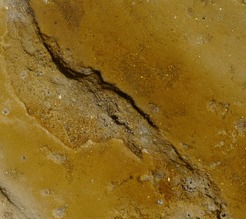
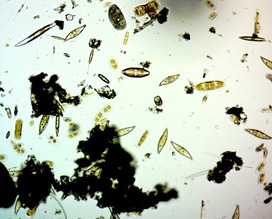
The workshop will be held over half a day (morning of Wednesday 2023/08/23) at the Brest Arena (site of the EPC8). The first part will be dedicated to talks from two experts in the field, followed by about 8 talks by young scientists (Ph.D. students and post-docs) illustrating the diversity of current research on microphytobenthos. The second part will be dedicated to a general discussion, especially focused on current and future challenges in microphytobenthos research.
Keynote lectures:
- Graham Underwood, University of Essex (UK) ‘Biofilms from the bottom up, how species attributes influence microphytobenthic ecosystem functioning’.
- David Paterson, Scottish Ocean Institute-St Andrews (UK) ‘Microphytobenthos response to multiple stressors’.
Workshop organisers:
Johann Lavaud, LEMAR Lab, UBO-University of Western Brittany-France
Vona Méléder, ISOMER Lab, Nantes University-France
Joao Serodio, CESAM Institute, Univesity of Aveiro-Portugal
Koen Sabbe, PEA Lab, University of Ghent-Belgium
Graham Underwood, School of Life Science, University of Essex-UK
Contact for info and talks: Johann Lavaud, johann.lavaud@univ-brest.fr
Getting together to fight the new invasive alien seaweed: Rugulopteryx okamurae (Dictyotales, Ochrophyta)
Since its first record on European coasts of Strait of Gibraltar in 2015, the brown Pacific seaweed Rugulopteryx okamurae has rapidly widespread along southern coasts of Spain, exhibiting an aggressive invasive behavior on native communities. This new invader homogenizes seabottoms, drastically reducing biodiversity, and producing important economic impacts on fisheries and for local governments, derived from the huge amounts of biomass drifting in the sea and on the beaches. Geographical distribution models predicted other European coasts to be highly favorable for the settlement of the species, which has already been confirmed, with the recent invasion of R. okamurae on Mediterranean coasts of France (Marseille), Portugal (Azores and Madeira) and Canary Islands (Spain). The presence of the species in several European countries together with Northern Africa, becomes R. okamurae in a common threat to Mediterranean and Atlantic native biodiversity, which demands joint efforts for an efficient management to minimize its ecological and economic impacts and expansion.
This workshop aims to be the first call for cooperation and information exchange of researchers, managers, and stakeholders for a better management of this new invader at European level. The global situation of the species in the different invaded areas will be presented, including information on geographical distribution, evaluation of ecological and economic impacts on the affected countries, identification and management of introduction and dispersal vectors, invasibity of R. okamurae and invasibility of native communities, as well as potential management strategies at European level.
The structure of the workshop will consist in a first part including communications of researchers from the different invaded areas (Spain, Morocco, France and Portugal) and a round table to discuss common problems and explore research and management potential synergies among participants.
Workshop programme: download here
Workshop organiser:
María Altamirano, Universidad de Málaga, Spain, altamirano@uma.es
The 100 Diatom Genomes Project
Diatoms are the most species-rich algal class with estimated ≥ 100,000 species. They contribute to 20% of global carbon fixation and oxygen production. However, with genomic information from only about 10 diatoms, our ability to harness their unique biology is very limited. Consequently, this project will sequence 100 diatom species for providing unique insights into their roles as key players for capturing carbon dioxide and as the foundation of diverse aquatic food webs. These insights will also be critical for advancing diatom-based biotechnology and synthetic biology platforms.
This workshop will give an overview about this project and discuss preliminary results. It will also address issues from diatom cultivation to sequence analysis. Informal setting with at least 2 talks and open discussion. Everyone is welcome to join and also to present. Length: up to 3 hours with a break.
Workshop organiser:
Thomas Mock, School of Environmental Sciences, University of East Anglia, Norwich Research Park, NR4 7TJ, UK, t.mock@uea.ac.uk
Exchange around drifting Sargassum species: fundamental and applied researches
The issue of drifting Sargassum is of current interest. The organization of a workshop would allow the community working on these organisms to meet and exchange ideas. Fundamental research on the genus Sargassum which presents drifted species: biology, ecology, physiology,… Applied research on the genus Sargassum which presents drifted species: valorization of huge biomasses (in several sectors), predictions of beachings,…
The idea is an exchange of experiences (from anywhere on the planet) about the study of drifting Sargassum. Actually, the Caribbean area presents huge quantity of holopelagic Sargassum that float throughout their life cycle at the surface of the Atlantic Ocean. Nevertheless, many regions of the world have to deal with Sargassum drift (part of their life cycle). It would be interesting if a sharing of knowledge, skills and know-how could take place during these round tables. It remains to be seen whether, at the end of these two round tables, we could come to the conclusion that certain actors could respond to joint calls for projects?
The workshop will take place in the form of two round tables (duration: 1h30 each):
(1) one on the knowledge/results of fundamental research on the biology of drifting Sargassum
(2) a second on the knowledge/results on the valorisation of drifting Sargassum
A short presentation will be given at the beginning of each round table and then each round table will be moderated by a facilitator and each participant will be able to present their knowledge/results during each round table. Everyone is welcome to join!
Workshop organiser:
Valérie Stiger-Pouvreau, LEMAR-IUEM-UBO, valerie.stiger@univ-brest.fr
Scientific Committee chaired by
Local organising committee
IUEM, SBR and Ifremer
Alfred Wegener Institute, Helmholtz Center for Polar and Marine Research, Bremerhaven, Germany
Stazione Zoologica Anton Dohrn, National Institute of Marine Biology, Ecology and Biotechnology, Italy
Chairs of the committee : Philippe Potin & Solène Connan
Members of the committee : Azzedine Badis | Yacine Badis | Eva Bucciarelli | Thomas Burel | Jonas Collen | Mark Cock | Emeline Creis | Eric Deslandes | Christophe Destombe | Simon Dittami | Laure Guillou | Bertrand Jacquemin | Cécile Klein | Martial Laurans | Johann Lavaud | Catherine Leblanc | Marc Long | Gabriel Markov | Sylvain Petek | Ian Probert | Andrés Ritter | Philippe Soudant | Nathalie Simon | Valérie Stiger-Pouvreau | Jill Sutton | Myriam Valéro
Scientific Committee chaired by
Alfred Wegener Institute, Germany
Stazione Zoologica Anton Dohrn, National Institute of Marine Biology, Ecology and Biotechnology, Italy
Local organising committee
IUEM, SBR and Ifremer
Heads of the comity : Philippe Potin & Solène Connan
Members of the comity : Erwan Ar Gall | Yacine Badis | Eva Bucciarelli | Jonas Collen | Mark Cock | Eric Deslandes | Christophe Destombe | Simon Dittami | Jacques Grall | Laure Guillou | Helene Hegaret | Claire Hellio | Cécile Klein | Martial Laurans | Johann Lavaud | Catherine Leblanc | Aude Leynaert | Gabriel Markov | Sylvain Petek | Philippe Pondaven | Ian Probert | Philippe Soudant | Nathalie Simon | Valérie Stiger-Pouvreau | Jill Sutton | Myriam Valéro
Sponsors
Come and enjoy western Brittany
The 8th European Phycological Congress will be held in Brittany (France) in Brest from August 20th to 26th 2023 at Brest-Arena, a sports and cultural center. This structure located at 10 min from the city center of Brest by tramway offers a plenary room allowing to welcome 700 persons as well as 3 other rooms of 200 places and the spaces of restoration and exhibition. Brest is a metropolis of 400,000 inhabitants, a tourist area as well as a living area. Many hotels ranging from 1 to 4 stars are located in Brest with prices ranging from 50 € to 150 € per night. Rooms for students are also available in the center of Brest, 10 minutes by tramway from Brest Arena. The city and its surroundings have many attractive facilities and points of interest, such as Océanopolis, the Ateliers des Capucins linked to the city center by the first urban cable car in France, and National Botanical Conservatory of Brest. The city was recently classified as a “City of Art and History”. Innovative and open to the world, Brest is distinguished from other French cities by its links with the marine environment, as well as its cutting-edge marine science and technology sector. In fact, it was from the port of Brest that great explorers set out to discover new worlds: La Pérouse, Kerguelen, Bougainville… Brest has a TGV train station in the city center and an international airport close to the city center, with a shuttle and tramway service. Brest Bretagne international airport offers some international flights and a large choice of flights via Paris (Orly or Charles de Gaulle).
Registrations
To participate, you will find here the procedure to submit your abstract (Deadline for submission: March 31, 2023) and to register to EPC8 as well as practical information.
Abstracts will be selected by the international scientific committee. Your registration will be official upon receipt of the registration fees.
The conference fees cover the conference registration, food, coffee breaks and transport from the airport or train station as well as daily transport to the conference venue.
Early bird registration (November 2022 – March 2023) :
[1] FEPS Member = 400 €
[2] Non-FEPS Member = 480 €
[3] MSc & PhD Student or unemployed = 250 €
[4] Accompanying person = 150 €
[5] Mid-Congress Excursion = 50/80 €
Late registration (April 2023 – July 2023) :
[1] FEPS Member = 530 €
[2] Non-FEPS Member = 600 €
[3] MSc & PhD Student or unemployed =380 €
[4] Accompanying person = 200 €
[5] Mid-congress Excursion = 60/100 €
Registration end : 1st August 2023
Info Covid
Considering the evolution of the health situation, we maintain our will to hold this conference face-to-face in order to encourage exchanges between everyone: leading researchers, young researchers and future researchers such as students.
If necessary, a complete vaccination scheme will be required to participate in the conference. The conference organizers will propose antigenic self-tests during the conference. The conferences, poster exhibition, workshops, catering and coffee breaks will take place under conditions that comply with health regulations.
However, if the situation deteriorates, a bi-modal format will not be considered and you will be informed. The event will then be cancelled.
Registration fees will be refundable based on the Covid environment at the time of the conference in August 2023.
For more information, please email: epc8@sciencesconf.org
